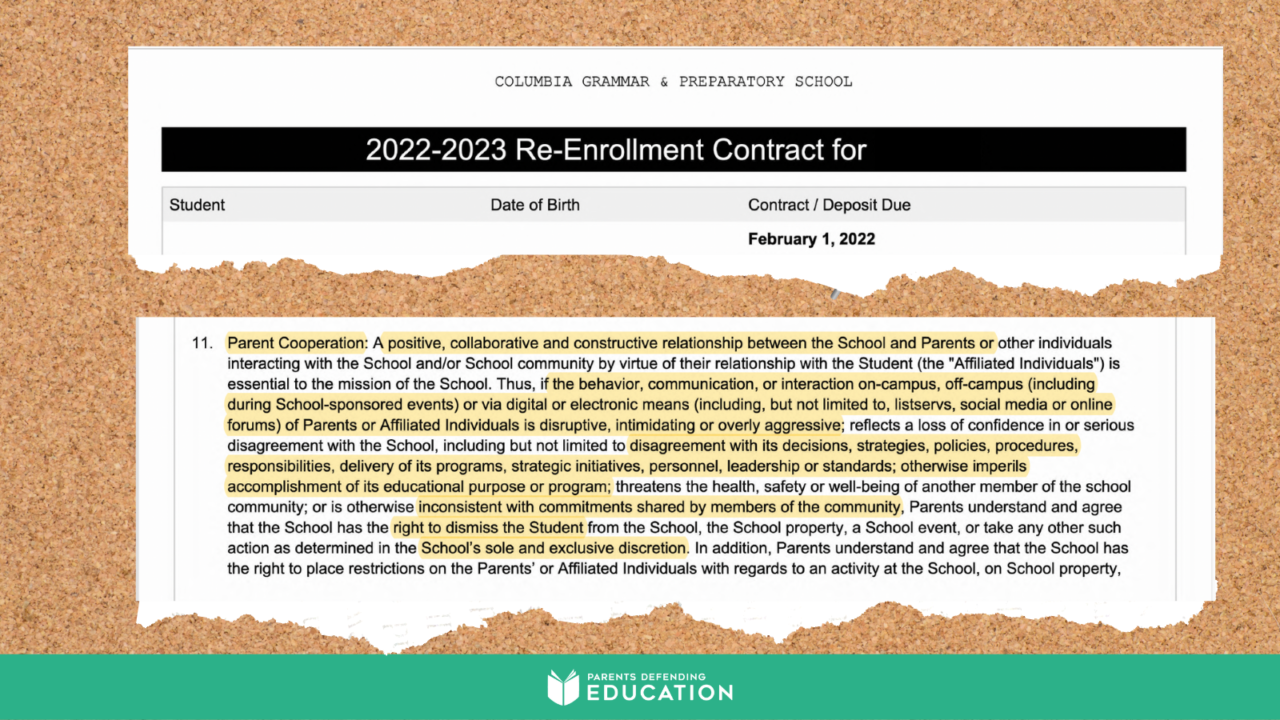
Columbia Grammar & Prep teaches students how to be a ‘white ally’ and ‘support social justice movements’; requires ‘parent cooperation’ in contract
Incidents

On Feb. 1, 2022, Columbia Grammar & Preparatory School in Manhattan launched a six-part series that includes a session for its prep school students on “what it means to be a white ally and how we can best support social justice movements.” The series began with an assembly called “Celebrate Black Joy & Agency” and was set to end on March 11.
Parents contacted Parents Defending Education and said students found the “superpower of storytelling” segment “uncomfortable and embarrassing.” Parents wondered why class time is being wasted with non-academic exercises. The Upper Westside prep school has made a number of controversial programming decisions in recent years. Tuition at the Upper Westside prep school will be $58,640 for the 2022-2023 academic year.
But the school’s enrollment contract contains a “Parent Cooperation” section which gives officials the right to expel a student for parent communications that reflect a “loss of confidence in or serious disagreement with the school,” according to a copy of the contract received by Parents Defending Education.
It states (page 4, point 11):
Parent Cooperation:
A positive, collaborative and constructive relationship between the School and Parents or other individuals interacting with the School and/or School community by virtue of their relationship with the Student (the “Affiliated Individuals”) is essential to the mission of the School. Thus, if the behavior, communication, or interaction on-campus, off-campus (including during School-sponsored events) or via digital or electronic means (including, but not limited to, listservs, social media or online forums) of Parents or Affiliated Individuals is disruptive, intimidating or overly aggressive; reflects a loss of confidence in or serious disagreement with the School, including but not limited to disagreement with its decisions, strategies, policies, procedures, responsibilities, delivery of its programs, strategic initiatives, personnel, leadership or standards; otherwise imperils accomplishment of its educational purpose or program; threatens the health, safety or well-being of another member of the school community; or is otherwise inconsistent with commitments shared by members of the community, Parents understand and agree that the School has the right to dismiss the Student from the School, the School property, a School event, or take any other such action as determined in the School’s sole and exclusive discretion. In addition, Parents understand and agree that the School has the right to place restrictions on the Parents’ or Affiliated Individuals with regards to an activity at the School, on School property, or at School-related events, if such Parents of Affiliated Individuals engage in behavior that the School determines, in its sole and exclusive discretion, to warrant such a restriction.”
Columbia Grammar & Preparatory School was established in 1764 as a boys’ preparatory school for Kings College, now known as Columbia University. The “Black Joy” assembly began with a “land acknowledgement” recited by the school’s interim prep school director. The director explained that the school had developed its land acknowledgment “in the fall of 2020 in partnership with an official representative from the Leni Lenape and Delaware people.”
Explaining that the theme of “Black Joy” was “a more balanced representation of the black experience,” the school’s inclusion counselor said she needed to recall “Black Joy” when she “is confronted with or challenged with oppression.” The assembly included brief talks by two “special guests” and four young alumni.
The “special guests” were Keeniun Brumskill, a designer and educator from Ethical Culture Fieldston School, an elite New York City independent school, and Jason Craige Harris, a senior advisor at Perception Institute, a New York City-based anti-discrimination consultancy, who previously worked as the diversity and inclusion director at Friends Seminary, another elite New York City independent school.


Perception Institute provides “needs assessments,” “affinity spaces,” “connection circles,” “mind science workshops,” research and evaluation and communications strategies to help “organizations achieve their goals of diversity, equity, and inclusion.” While working for Friends Seminary, Harris created “affinity groups” and promoted the sharing of gender pronouns. One Friends Seminary student said he helped draft a student campaign against the school’s dress code. Another student said he helped with the student’s name change.
Harris began his talk by telling students, “What I hope to share with you comes from my own life as a black cisgender man bent on celebrating every moment of my glorious existence.”
He explained he would be speaking about “moments” in his life where he “experienced black joy” which were times when he felt like he was “enough” since “self editing is a form of violence.”
“Because society’s fantasies about me are so often confining and narrow,” he continued, “I have had to develop a capacity to tell myself a counter-story: When my kindergarten teacher told my mom that I had quote ‘a mental problem,’ I told myself in fact that I have mental gifts…when my teacher taught me that God was the one who sent Europeans to the continent of Africa to punish them for their heathenistic ways, I told myself that God was in fact a black woman…when they said I was too black, too white, too feminine, too poor, too nerdy, too, too, too, I told myself over and over again on repeat that I am worthy of love and esteem just as I am.”
“Maya Angelou said,“ he reminded students, “there is no greater agony than bearing an untold story inside you.”
Harris said he was inspired by black organizer Fannie Lou Hamer, black activist and leader Ella Baker, black lesbian feminist poet Audre Lorde, black intellectual Cornel West, black gay novelist and essayist James Baldwin and black radical singer Adrienne Maree Brown.
Stay Informed

